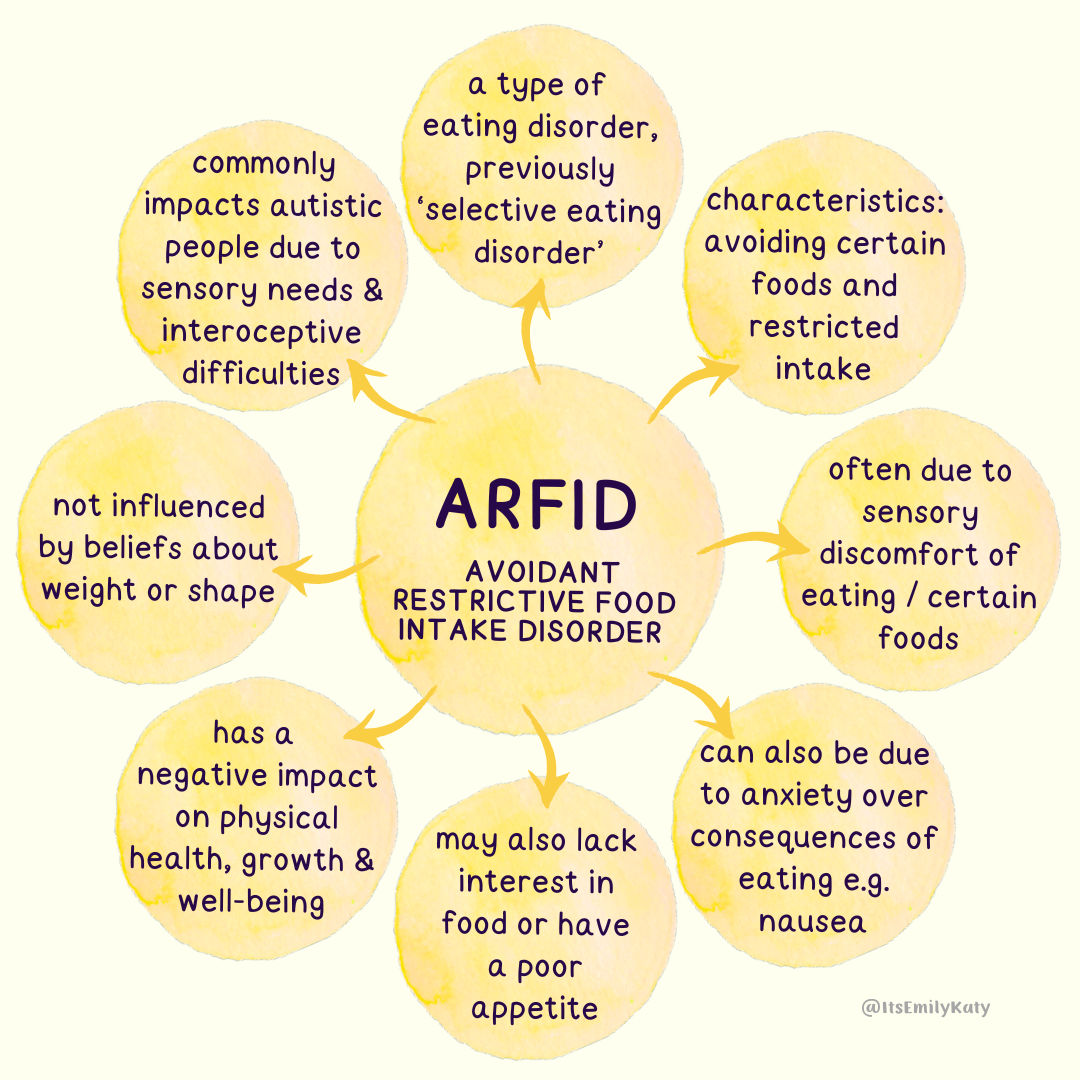ARFID Awareness Day
Today is the first ever ARFID Awareness Day, thanks to the hard work of ARFID Awareness UK - the UK’s only charity dedicated to raising awareness of ARFID.
Avoidant Restrictive Food Intake Disorder (aka ARFID) is an eating disorder which lacks awareness and understanding. It was previously called ‘Selective Eating Disorder’, but ARFID was recognised in the DSM-V (our diagnostic manual) in 2013.
ARFID is characterised by:
a lack of interest in eating or food
avoidance of food due to sensory sensitivities of food (hence, it is estimated that up to a third of people with ARFID are autistic)
concern about the negative consequences of eating
The diagnostic criteria explains that this is associated with a ‘persistent failure to meet appropriate nutritional and/or energy needs associated with one or more of the following:
significant weight loss (or failure to achieve expected weight gain or faltering growth in children)
dependence on enteral feeding or oral nutritional supplements
significant nutritional deficiency
marked interference with psychosocial functioning.’
It is not just fussy eating. It can have serious, life-threatening and life-limiting consequences.
“The difference between a ‘picky eater’ and a child with ARFID, is that a picky eater won’t starve themselves to death. A child with ARFID will.”
Despite the seriousness of the condition, there are currently no treatment guidelines. It does not appear in the NICE (National Institute of Health and Care Excellence) guidelines, meaning there is usually no funding for it and no service pathways. So often people with ARFID don’t receive the care they need and deserve.
A core reason for this is the lack of research establishing effective treatments. However, there is some evidence showing that adapting interventions currently used for treating anorexia can have good outcomes (ARFID Awareness UK, 2024). Other research demonstrates that there are a variety of psychological interventions which can be used (Willmott, 2023). There are urgent calls for more research into interventions, treatment guidelines to be developed, and commissioning for support.
Today is a landmark occasion for ARFID. The more we shout that people with ARFID deserve better, the more people that know about ARFID, the more awareness that is raised, and the more likely we are to be heard.
Where to find support:
ARFID Awareness UK are a registered charity dedicated to raising awareness and understanding of ARFID. You can join their online communities to connect with others.
Endeavor (run by BEAT) is a carer support group for parents/carers of children aged 5-15 years with ARFID (in some areas of the UK). They offer an 8 week online programme of support for certain areas.
BEAT also provide information about ARFID on their website.
The ARFID journal (@thearfidjournal) created by Ruby Hicks is a self-directed resource which may benefit teens and adults with ARFID.
Lauren Sharifi Nutrition (@arfid.dietitian on instagram) has a wealth of resources on her website and instagram page.
GIRL UNMASKED (The Sunday Times Bestseller) is available to order from Amazon and all major bookstores! https://linktr.ee/girlunmasked
References:
ARFID Awareness UK. (2024). Treating ARFID. https://www.arfidawarenessuk.org/treatment
Priory Group. (2024). ARFID and Autism - what’s the connection? https://www.priorygroup.com/blog/arfid-and-autism
Willmott, et al. (2023). A scoping review of psychological interventions and outcomes for avoidant and restrictive food intake disorder (ARFID). International Journal of Eating Disorders, 57(1), 27-61. https://doi.org/10.1002/eat.24073

